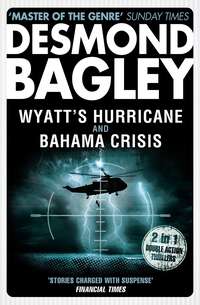
Полная версия
Windfall
Hardin found that interesting but he made no comment. ‘But the details of the original letter from England should be in the files.’
‘I guess so,’ said Richardson without enthusiasm. ‘But you know how Gunnarsson is about security. The computer logs every inquiry into any case and Gunnarsson checks the log.’
‘He can’t check every log; he’d be doing nothing else.’
‘Spot checks mostly,’ admitted Richardson. ‘But if he’s handling the Hendrix case personally that’s one log he might very well check. I can’t risk it, Ben. I don’t want to get fired, too.’
‘For Christ’s sake!’ said Hardin in disgust. ‘You know enough about the computer to gimmick a log. You wrote the goddamn programs for the data base.’
‘What’s your interest in this?’
‘I’m damned if I know; I’ve got to do some hard thinking. There’s something wrong somewhere. I feel it in my bones. But, for your information, Gunnarsson isn’t handling the Hendrix case. I’ve been handling it, and I cracked it. Then I get fired. I’d like to figure out why I was fired.’
‘Okay, Ben; I’ll see what I can do,’ said Richardson. ‘But you don’t talk about this. You keep your mouth zipped.’
‘Who would I talk to? When can I have it?’
‘I’ll see what I can do tomorrow. I’ll meet you in here at midday.’
‘That’s fine,’ said Hardin and drained his glass. ‘This one’s on me. Then I’ll go clean out my desk like a good boy.’ He signalled the bartender, ‘I wonder what Gunnarsson’s idea of severance pay is.’
FIVE
Gunnarsson’s idea of severance pay made Hardin madder than ever. He tried to complain but could not get past the acidulated spinster who guarded Gunnarsson’s office, and neither could he get through on the phone. Gunnarsson’s castle was impregnable.
But Richardson came up with the information he needed next day. He gave Hardin an envelope and said, ‘You don’t know where you got it.’
‘Okay.’ Hardin opened the envelope and took out a single piece of paper. ‘This isn’t a computer print-out.’
‘You’re damned right it isn’t,’ said Richardson, if Gunnarsson found a printout with that information floating loose he’d head straight for me. Is it what you want?’
Hardin scanned it. A London inquiry agency, Peacemore, Willis and Franks, requested Gunnarsson Associates to search for any living relatives of Jan-Willem Hendrykxx—Hardin blinked at the spelling—and to pass the word back. Hendrykxx was reputed to have married in South Africa and to have had two sons, one of whom was believed to have emigrated to the United States in the 1930s. There was also the address and telephone number of a lawyer in Jersey.
It told Hardin nothing he did not know already except for the unusual spelling of Hendrix, and the Jersey address confused him until he realized that it referred to the original Jersey in the Channel Islands and not the state of New Jersey. He nodded. ‘This is it.’ There was something more. Peacemore, Willis and Franks was the British end of Gunnarsson Associates, a fact not generally known. It meant that Gunnarsson had been in it right from the start, whatever ‘it’ was. ‘Thanks. It’s worth a drink, Jack.’
If Hardin was mad at Gunnarsson he was also broke. He moved out of his apartment on the East Side and into a rooming house in the Bronx. It cost more in subway and bus fares to get into Manhattan but it was still cheaper. He wired instructions to San Francisco to sell his car and wire the money. He did not expect much but he needed the cash, and a car was a needless luxury in the city.
He carefully maintained his pipelines into the offices of Gunnarsson Associates, mainly through Jack Richardson, although there were a couple of secretaries whom he took to frugal lunches and pumped carefully, trying to get a line on what Gunnarsson was doing in the matter of Hank Hendrix. The answer, apparently, was nothing at all. Worse still, Hendrix had vanished.
‘Maybe Gunnarsson sent him to England,’ Richardson said one day.
‘You can check that,’ said Hardin thoughtfully. ‘There’ll be an expense account for the air fare. Do me a favour.’
‘Goddamn it!’ said Richardson heatedly. ‘You’ll get me fired.’ But he checked and found no record of transatlantic flights since Hendrix had arrived in New York. On his own initiative he checked for any record of medical expenses paid out for the treatment of Hendrix’s wound and, again, found nothing. He was a good friend to Hardin.
‘Gunnarsson is playing this one close,’ commented Hardin. ‘He’s usually damned hot on record keeping. I’m more and more convinced that the bastard’s up to no good. But what the hell is it?’
Richardson had no suggestions.
Probably Hardin would not have pressed on but for a genuine stroke of luck. Nearly a month had passed and he knew he had to get a job. His resentment at Gunnarsson had fuelled him thus far but an eroding bank account was a stronger argument. He had set aside enough for Annette’s next payment and that he would not touch, but his own reserves were melting.
Then he got a wire from Annette. ‘GOT MARRIED THIS MORNING STOP NOW MRS KREISS STOP WISH ME LUCK ANNETTE.’
‘Thank God!’ he said to Richardson. ‘Now some other guy can maintain her.’ Briefly he wondered what sort of a man this stranger, Kreiss, was then put the matter out of his mind. For he was now the master of unexpected wealth and his heart was filled with jubilation. ‘Now I can do it,’ he said.
‘Do what?’ asked Richardson.
‘I’m flying to England.’
‘You’re nuts!’ Richardson protested. ‘Ben, this obsession is doing you no good. What can you do in England?’
‘I don’t know,’ said Hardin cheerfully. ‘But I’ll find out when I get there. I haven’t had a vacation in years.’
Before leaving for England he flew to Washington on the shuttle where he renewed acquaintance with some of his old buddies in the Company and armed himself with some British addresses, and he visited the British Embassy where he ran into problems. No one knew much about Jersey.
‘They’re autonomous,’ he was told. ‘They have their own way of doing things. You say you want to know about a will?’
‘That’s right.’
‘In London a copy would be kept in Somerset House,’ said the attaché. ‘But I don’t think that applies to Jersey wills.’ He thought for a moment then his face lightened. ‘I do believe we have someone who would know.’ He picked up a telephone and dialled, then said, ‘Pearson here. Mark, you’re a Jerseyman, aren’t you? Yes I thought so. Would you mind popping in here for a moment?’ Pearson put down the telephone. ‘Mark le Tissier should know about it.’
And Mark le Tissier did. ‘Wills are kept in the Greffe,’ he said.
‘The what?’
‘The Greffe.’ Le Tissier smiled. ‘The Public Records Office. I had the same problem a couple of years ago. They’ll give you a copy.’
‘All I have to do is to go to this place, the Greffe, and ask?’
‘Oh you don’t have to go. Just drop a line to the Greffier. We’ll go into the library and dig out his address.’
So Hardin went back to New York and wrote to Jersey, giving as return address poste restante at the London office of American Express. A few days later he flew and the day he left from Kennedy Airport the rooming house in the Bronx in which he lived burned to the ground though he did not know about it until long after. Still, it could have been chance; there are, after all, whole blocks burned out in the Bronx.
In the employment of Gunnarsson Associates Hardin had learned how to travel light. He freshened up before landing at Heathrow in the early morning and cleared Customs quickly while the rest of the passengers were waiting for their baggage, then took the Underground into London where he registered at an inexpensive hotel near Victora Station. He then walked through St James’s Park towards the Haymarket where he picked up his mail.
He enjoyed the walk. The sun was shining and he felt oddly contented and in a holiday mood as he strolled by the lake. It was true that it had been some years since he had taken a real vacation. Perhaps he had been getting in a rut and the split with Gunnarsson was to be good for him in the long run. He had little money and no prospects but he was happy.
After leaving the American Express office Hardin bought a street plan of London from a news vendor because, although he was no stranger to London, it was many years since he had been there. Then he went into a pub to inspect the single letter he had received. The envelope was bulky and bore Jersey stamps. He ordered a half pint of beer at the bar and took it to a corner table, then opened the envelope.
The will was seven pages long. Jan-Willem Hendrykxx had left £10,000 to Dr Morton, his physician, as a token of esteem for keeping him alive so long, £20,000 to Mr and Mrs Adams, his butler and housekeeper, and various sums of between £1,000 and £4,000 to various members of his staff, which appeared to be large.
Detailed instructions were given for the sale of his real property of which he had a plenitude; a house in Jersey, another in the South of France, yet another in Belgium, and a whole island in the Caribbean. The sums arising from these sales and from the sale of his other possessions were to be added to the main part of his estate. Hendrykxx had evidently been a careful man because the will was up-to-date and he had estimated the current market values of his properties. Thenceforth the terms were expressed in percentages; 85 per cent of his estate was to go to the Ol Njorowa Foundation of Kenya, and 15 per cent to be divided equally among his living descendants.
The name of the executor was given as Harold Farrar of the firm of Farrar, Windsor and Markham, a Jersey law firm. Hardin made a note of the address and the telephone number. His hand trembled a little as he noted the size of the estate.
It was estimated at forty million pounds sterling.
Hardin drank his beer, ordered another, and contemplated what he had discovered. Hank Hendrix and Dirk Hendriks, if he was still around, stood to split £6 million between them. He translated it into more familiar terms. The rate of the dollar to the pound sterling had been volatile of late but had settled at about two to one. That made twelve million bucks to split between two if there were no other heirs and he knew of none, unless Dirk Hendriks had children. That dope-smuggling drop-out, Hank Hendrix, was a multi-millionaire. The main bulk of the fortune might be going to the foundation with the funny name but the residue was not peanuts.
Hardin smiled to himself. No wonder Gunnarsson had been so interested. He always knew the value of a dollar and would not resist the temptation to put himself alongside six million of them in the hope of cutting himself a slice. He had isolated Hendrix and that young man would be no match for Gunnarsson who could charm birds from a tree when he wanted to. Gunnarsson would cook up some kind of deal to guarantee that some of those dollars would stick to his fingers.
So what was the next step? Hardin walked to the corner of the bar where there was a telephone and checked the directory which lay on a shelf next to it. He turned to ‘H’ and found the Hendriks’s; there were more than he expected of that spelling, perhaps fifteen. He ran his fingers down the column and found ‘Hendriks, D.’ On impulse he checked the variant spelling of ‘Hendrykxx’ but found no entry.
He returned to his table and consulted the street map. The address was near Sloane Square and the map of the London Underground gave his route. He patted his jacket over his breast pocket where he had put the will. Then he finished his drink and went on his way.
Coming up from the subway at Sloane Square he discovered himself in what was obviously an upper class section of London comparable to the 70s and 80s of Manhattan’s East Side. He found the street he was looking for, and then the house, and gave a low whistle. If Dirk Hendriks lived in this style he was in no particular need of a few extra millions.
Hardin hesitated, feeling a bit of a fool. He had found what he wanted to know—why Gunnarsson had been so secretive—and there was nothing in it for him. He shrugged and thought that perhaps Hank was in there with his cousin; the place looked big enough to hold an army of Hendrixes. He would like to see the kid again. After saving his life and ministering to his wounds he felt a proprietary interest. He walked up the short flight of steps to the front door and put his finger on the bellpush.
The door was opened by a young woman in a nurse’s uniform. Someone sick? ‘I’d like to see Mr Hendriks—Dirk Hendriks,’ he said.
The young woman looked doubtful. ‘Er…I don’t think he’s here,’ she said. ‘You see, I’m new. I haven’t been here long.’
Hardin said, ‘What about Henry Hendrix?’
She shook her head. ‘There’s no one of the name here,’ she said. ‘I’d know that. Would you like to see Mrs Hendriks? She’s been resting but she’s up now.’
‘Is she sick? I wouldn’t want to disturb her.’
The nurse laughed. ‘She’s just had a baby, Mr…er…’
‘Sorry. Hardin, Ben Hardin.’
She opened the door wider. if you come in I’ll tell her you’re here, Mr Hardin.’
Hardin waited in a spacious hall which showed all the evidences of casual wealth. Presently the nurse came back. ‘Come this way, Mr Hardin.’ She led him up the wide stairs and into a room which had large windows overlooking a small park. ‘Mrs Hendriks; this is Mr Hardin.’ The nurse withdrew.
Mrs Hendriks was a woman in her mid-thirties. She was short and dark, not particularly beautiful but not unattractive, either. She used make-up well. As they shook hands she said, ‘I’m sorry my husband isn’t here, Mr Hardin. You’ve missed him by twenty-four hours. He went to South Africa yesterday. Do you know my husband?’
‘Not personally,’ said Hardin.
‘Then you may not know that he’s a South African.’ She gestured. ‘Please sit down.’
Hardin sat in the easy chair. ‘It’s not your husband I really want to see,’ said Hardin, ‘It’s Han…Henry Hendrix I’d like to visit with.’
‘Henry?’ she said doubtfully.
‘Your husband’s cousin.’
She shook her head, ‘I think you’re mistaken. My husband has no cousin.’
Hardin smiled. ‘You may not know of him. He’s an American and they’ve never met. Least, that’s what Hank told me. That’s how he’s known back home. Hank Hendrix; only the name is spelled different with an “X” at the end.’
‘I see. But I still think you’re mistaken, Mr Hardin. I’m sure my husband would have told me.’
‘They’ve never met. A few letters is all, and those some years ago.’ Hardin was vaguely troubled. ‘Then Hank hasn’t been here?’
‘Of course not.’ She paused. ‘He might have come when I was in confinement. I’ve just had a baby, Mr Hardin, and modern doctors prefer maternity wards.’
‘The nurse told me,’ said Hardin. ‘Congratulations! Boy or girl?’
‘I have a son,’ she said proudly. ‘Thank you, Mr Hardin.’ She reverted to the problem. ‘But Dirk would have told me, I’m sure, if a long-lost cousin had arrived out of the blue.’
‘I’m sure he would have,’ said Hardin sincerely, and his sense of trouble deepened. If Hank had come to England he would have certainly looked Dirk up; all it took was a phone book. Damn it, the Jersey lawyer would have certainly introduced them. Jack Richardson had checked that flight tickets had not been bought, so where in hell was Hank and what game was Gunnarsson playing?
His worry must have shown on his face because Mrs Hendriks said gently, ‘You look troubled, Mr Hardin. Is there anything I can do to help?’
Hardin felt the copy of the will in his pocket. At least that was real. He said, ‘Has Mr Hendriks heard from a lawyer about his grandfather’s will?’
Mrs Hendriks was astonished. ‘His grandfather! My husband’s grandfather died years ago in South Africa. Or, at least, I’ve always assumed so. Dirk has never mentioned him.’
Hardin took a deep breath. ‘Mrs Hendriks; I have something to tell you and it may take a while. It’s like this…’
SIX
Max Stafford was contemplating the tag end of the day and thinking about going home when his telephone rang. It was Joyce, his secretary. ‘Mrs Hendriks is on the line and wants to talk to you.’
‘Put her through.’
There was a click. ‘Max?’
‘Hello, Alix. How is motherhood suiting you?’
‘Great. I’m blooming. Thank you for the christening mug you sent young Max. A very elegant piece of Georgian silver. He’ll drink your health from it on his coming-of-age.’
Stafford smiled. ‘Is it eighteen or twenty-one these days? I’ll be a bit long in the tooth then.’
She laughed. ‘But that’s not why I rang; there’s a proper “Thank you” letter in the post. Max, I need your advice. A man, an American called Hardin, came to me yesterday with a strange story concerning Dirk. Now, Dirk isn’t here—he’s in South Africa. I tried to ring him last night but he seems to be on the move and no one knows exactly where he is. I’d like you to see this man before he goes back to America.’
‘What sort of strange yarn is he spinning?’
‘It’s a bit difficult to explain and I probably wouldn’t get it right. It’s complicated. Please see him, Max.’
Stafford pondered for a moment, ‘Is Dirk in trouble?’
‘Nothing like that. In fact it might be the other way round. Dirk might inherit something according to Hardin, but there’s something odd going on.’
‘How odd?’
‘I don’t know,’ she said, ‘I can’t get the hang of it.’
‘When is Hardin going back to the States?’
‘Tomorrow or the day after. I don’t think he can afford to stay.’ She hesitated, ‘I would like your advice, Max; you’ve always been wise. Things have been difficult lately. Dirk has been broody for quite a while—ever since I told him I was pregnant. It’s been worrying me. And now this.’
‘This Hardin character isn’t blackmailing you, is he?’
‘It’s nothing like that,’ she protested. ‘Can you come to lunch? I’ll see that Hardin is here.’
Stafford thought about it. His in-tray was overflowing and Joyce was a strict secretary. Still, this might be something he could sort out in an hour. ‘All right,’ he said. ‘I’ll be with you at twelve-thirty.’
‘Thank you, Max,’ said Alix warmly, ‘I knew I could depend on you.’
Stafford put down the telephone and sat thinking. Presently he became aware that Ellis was standing before him snapping his fingers. ‘Come out of your trance. Got a problem?’
Stafford started. ‘Not me—Alix Hendriks. It seems that Dirk doesn’t relish being a father. He’s whistled off to South Africa and left Alix holding the three-week-old baby which I consider bloody inconsiderate. And now she’s come up against someone who sounds like a con man, and Dirk isn’t around. She wants my advice.’
‘The last time you helped Alix you came to the office with your arm in a sling,’ said Ellis. ‘Watch it, Max.’
‘That kind of lightning doesn’t strike twice,’ said Stafford.
Stafford soon found that the problem presented by Alix was not to be sorted out in an hour. He arrived on time at the house in Belgravia and found Hardin already there, a balding man in his mid-fifties with a pot belly like a football. To Stafford’s eye he looked seedy and rundown. After gravely inspecting and admiring Stafford’s three-week-old namesake the three of them adjourned to the dining room for lunch and Hardin retold his story.
It was three in the afternoon when Stafford held up the sheaf of papers. ‘And this is purported to be the will?’
Hardin’s face reddened, ‘It is the goddamn will. If you don’t believe me you can get your own copy. Hell, I’ll even stand the cost myself.’
‘All right, Mr Hardin; cool down.’
During Hardin’s narrative Stafford had been revising his opinion of the man. If this was a con trick he found it difficult to see the point because there was nothing in it for Hardin. The will was obviously genuine because its source could be so easily checked and the passing of a fake will through the Probate Court was inconceivable. Besides, there was Gunnarsson.
He said, ‘What do you think Gunnarsson has done with Hendrix?’
Hardin shrugged, ‘I wouldn’t know.’
‘Would you call Gunnarsson an ethical man?’
‘Christ, no!’
‘Neither would I,’ said Stafford dryly.
‘You know him?’ said Hardin in surprise.
‘Not personally, but he has caused me a considerable amount of trouble in the past. We happen to be in the same line of business but reverse sides of the coin, as you might say. I run Stafford Security Consultants.’
Hardin was even more surprised. ‘You’re that Stafford? Well I’ll be damned!’
Stafford inspected the will. ‘Old Hendrykxx was either wise or had good advice.’
Alix poured more coffee. ‘Why?’
‘Setting up in the Channel Islands. No death duties, capital gains tax or capital transfer tax. It looks as though Dirk will get about three million quid free and clear. I know quite a bit about that aspect. When we went multinational we began to put our business through the Channel Islands.’ He laid the will on the table. ‘Who do you think shot Hendrix in Los Angeles?’
‘That I don’t know, either,’ said Hardin, ‘I can only guess. There were other guys looking for Hendrix besides me. I told you that.’
‘Who could be German,’ said Stafford. ‘All right, Mr Hardin; why did you come to England?’
‘I was so mad about the way Gunnarsson shafted me that I wanted to do something about it. Call it revenge, if you like. I drew a blank in New York and when I got a few unexpected dollars I came over here.’ Hardin shrugged and pointed at the will. ‘When I saw that, I knew damn well what Gunnarsson was doing, but there’s not a thing I can do about it. But I came here to see Hank and to tell him to watch his step with Gunnarsson and to put a zipper on his wallet.’
Stafford was pensive for a while. At last he said, ‘How long are you staying in England?’
‘I’m leaving tomorrow or maybe the day after. Depends on when I can get a reservation.’ Hardin smiled wryly. ‘I have to get home and go back to earning a living.’
‘I’d like you to stay a little longer. Your expenses will be paid, of course.’ Stafford glanced at Alix, who nodded. He did not know exactly why he wanted Hardin to stay. He just had an obscure feeling that the man would be handy to have around.
‘I don’t mind staying on that basis,’ said Hardin.
Stafford stood up. ‘If you let me have the name of your hotel I’ll be in touch.’
‘I have it,’ said Alix.
‘Then that’s it for the moment. Thank you, Mr Hardin.’ When Hardin had gone Stafford said, ‘May I use your phone?’
Alix looked up from clearing away the coffee cups. ‘Of course. You know where it is.’
Stafford was absent for five minutes. When he came back he said, ‘Jan-Willem Hendrykxx really did exist. I’ve been talking to my man in Jersey who looked him up in the telephone book. His name is still listed. I think Hendrykxx is a Flemish name.’ He picked up the will. ‘That would account for the house in Belgium. I’ve asked my chap to give me a discreet report on the executor of the estate and to find out when and how Hendrykxx died.’
Alix frowned. ‘You don’t suspect anything…? I mean he must have been an old man.’
Stafford smiled. ‘I was trained in military intelligence. You never know when a bit of apparently irrelevant information will fit into the jigsaw.’ He scanned the will. ‘The Ol Njorowa Foundation stands to inherit about thirty-four million pounds. I wonder what it does?’ He sat down. ‘Alix, what’s this with you and Dirk? You sounded a shade drear on the phone this morning.’
She looked unhappy. ‘I can’t make him out, Max. I don’t think fatherhood suits him. We were happy enough until I got in the family way and then he changed.’
‘In what way?’
‘He became moody and abstracted. And now he’s pushed off back to South Africa just when I need him. The baby’s just three weeks old—you’d think he’d stay around, wouldn’t you?’









